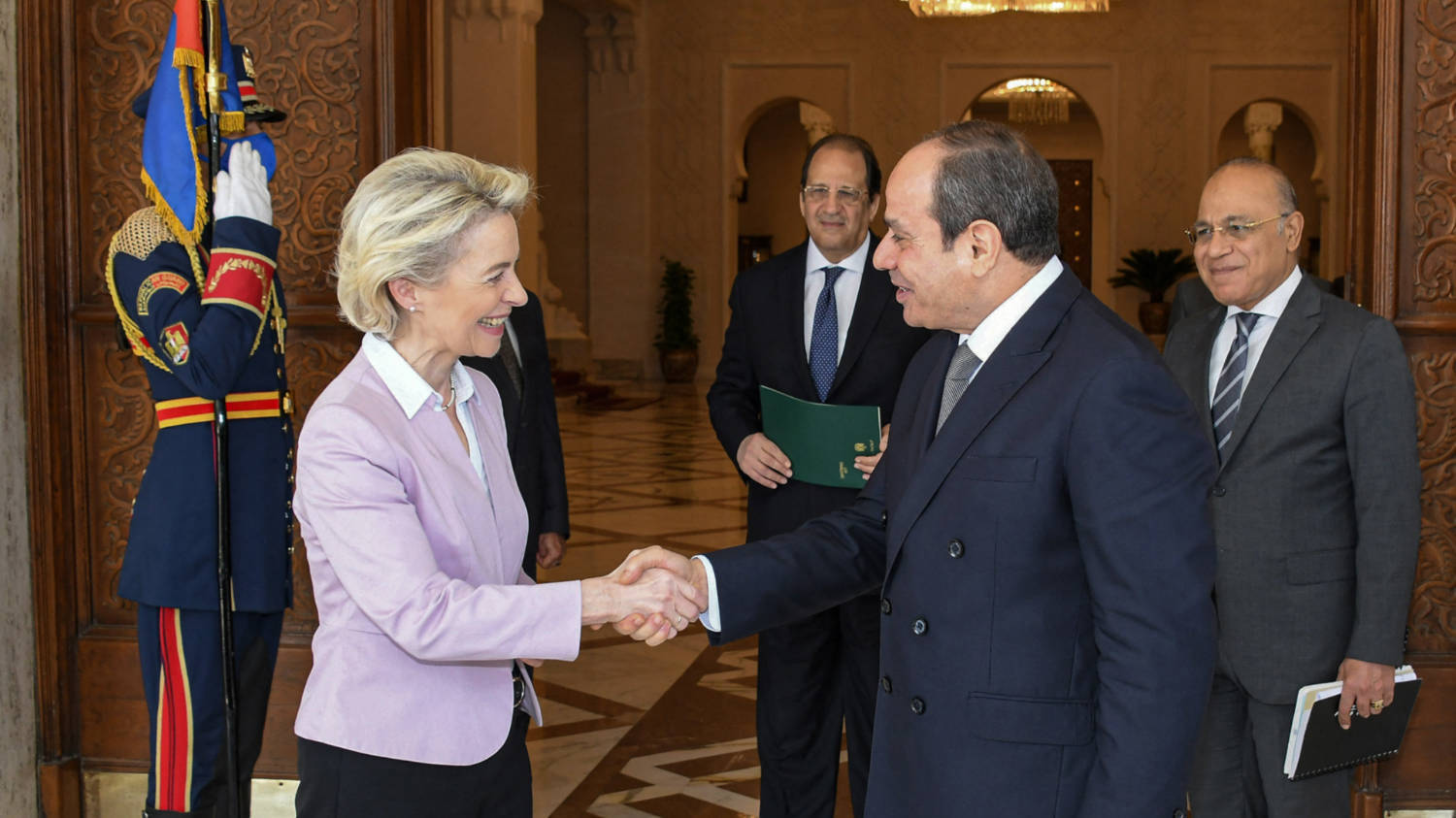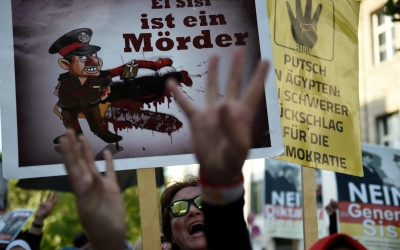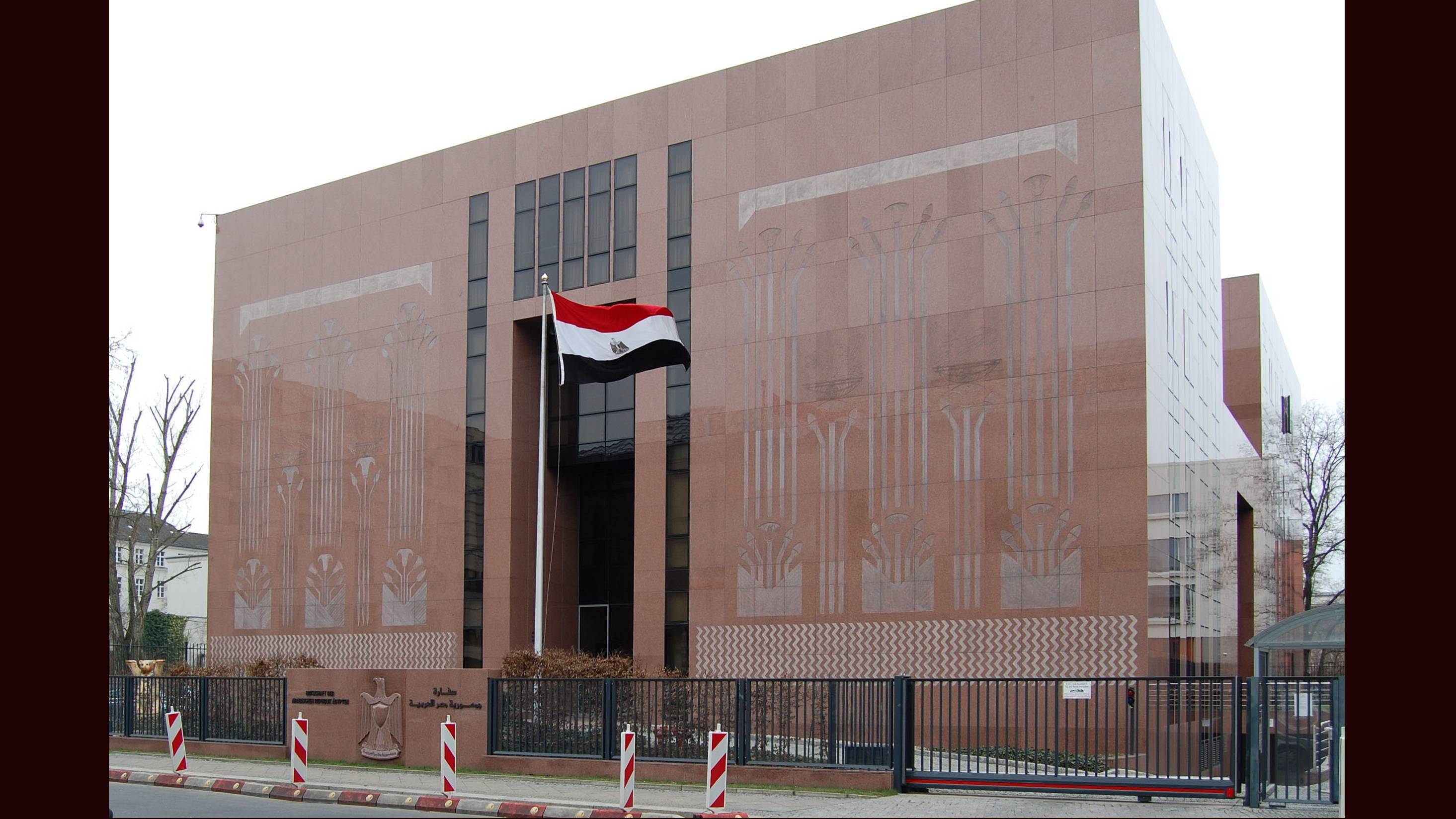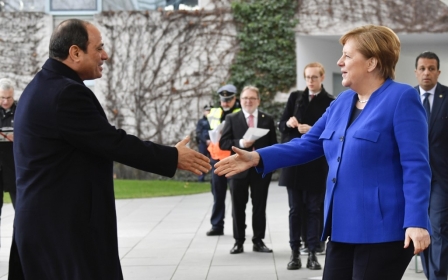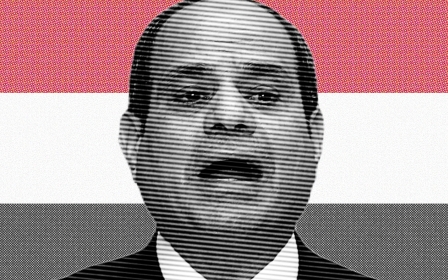Badr Abdelatty: Why is Egypt’s new foreign minister controversial?
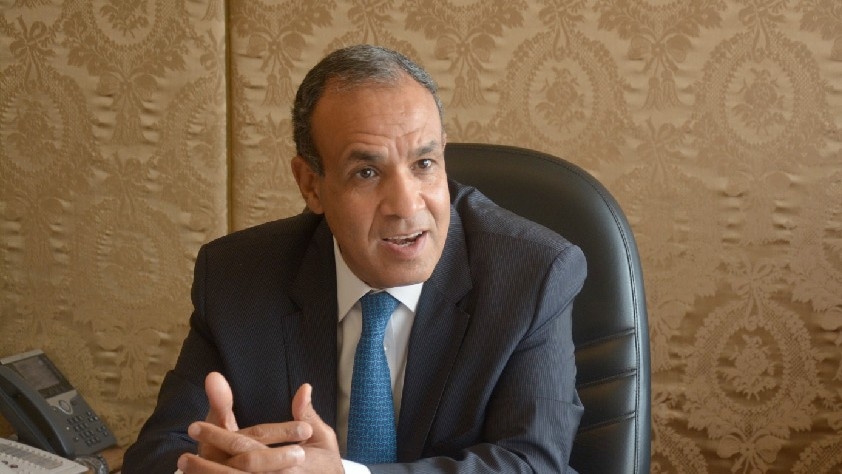
Badr Abdelatty, a career diplomat, has replaced Sameh Shoukry as Egypt's minister of foreign affairs after Shoukry held the post for 12 years.
In a government reshuffle on 3 July, Abdelatty, 58, was sworn in before President Abdel Fattah el-Sisi, taking charge of two merged ministries: the Ministry of Foreign Affairs and the Ministry of Emigration and Egyptian Expatriate's Affairs.
Previously, Abdelatty served as Egypt's ambassador to Brussels and the EU from 2022 onwards.
Born in 1966, he graduated from the Faculty of Economics and Political Science at Cairo University. He began his career at the Ministry of Foreign Affairs in 1991 as the third secretary of the Egyptian embassy in Israel and later served in various positions at Egyptian embassies in the United States and Japan.
He was appointed director of Palestine affairs at the ministry between 2007 and 2008 and subsequently served as deputy assistant secretary of state for European Union and Western European affairs between 2012 and 2013.
New MEE newsletter: Jerusalem Dispatch
Sign up to get the latest insights and analysis on Israel-Palestine, alongside Turkey Unpacked and other MEE newsletters
Abdelatty was Egypt’s ambassador to Germany from 2015 to 2019, a period marked by a crackdown on Egyptian activists returning from Germany.
What are Abdelatty's views on Sisi's rule?
In July 2013, Sisi’s military coup ousted elected President Mohamed Morsi. Badr Abdelatty became the deputy assistant minister of foreign affairs and the ministry’s official spokesperson, a position he held from 2013 to 2015.
Since the coup, Abdelatty has been a vocal supporter of both the takeover and the subsequent administration. He has consistently denied human rights violations and criticised reports raising concerns about freedom of expression after 2013.
In response to a 2015 Amnesty International report condemning the detention of 18 journalists, Abdelatty denied that Egypt had targeted journalists.
"Nobody is being targeted for being a journalist. Such accusations are politicised nonsense," he told Reuters in May 2015.
Abdelatty also defended the detention of Al Jazeera journalist Ahmed Mansour in Germany in 2015 at Egypt's request, despite criticism from rights groups and German politicians.
"He [Ahmed Mansour] is accused of a crime and was sentenced, so of course, we have called for him to be returned," he said at the time.
Mansour was later released and Germany's interior ministry refused to extradite him to Egypt, citing the risk of the death penalty.
According to a diplomatic source in Cairo, Abdelatty is the face of the pro-military faction within the foreign ministry.
“The choice of Abdelatty symbolises a shift to considering the ministry as another militarised state apparatus that follows orders from the security apparatus,” the source told Middle East Eye on condition of anonymity, fearing reprisal.
The source added that in recent years, “there have been several interventions by intelligence officials to militarise the ministry and the diplomatic sector”.
Additionally, the source noted that diplomats accepted into the ministry attended courses and training at the military academy and the General Intelligence Service (GIS), as well as courses at the Military Academy for Postgraduate and Strategic Studies, formerly known as the Nasser Military Academy.
What are Abdelatty's views on Egypt and the EU?
State-linked media outlet Sada el-Balad has called Abdelatty "the architect of Egyptian-European relations over the last decade".
During Abdelatty's tenure as a diplomat in Berlin and Brussels, notable developments included a 2022 agreement to export gas from Israel via Egypt to the EU, aimed at reducing European dependence on Russian energy. His tenure also saw multibillion-dollar investment and finance agreements with the EU, which rights groups have denounced as “rewarding the authoritarianism” of the Sisi regime.
A source who worked at one of Egypt’s European embassies when Abelatty was ambassador in Brussels told MEE that the new minister has often “championed the notion that Egypt might let loose immigrants upon Europe if the EU does not continue to support the government and ignore its human rights violations".
“He was often vocal that Egypt was protecting Europe from a surge of illegal immigrants, which is a narrative that the political establishment has adopted since 2017 when Europe started to restore its trust in Sisi," the source added.
Why is Abdelatty considered an informant?
Abdelatty served as Egypt’s ambassador in Berlin from 2015 to 2019. The city has long been a hub for critics of Cairo, including researchers, students, journalists, and activists.
In 2017, Egypt signed a controversial security agreement with Berlin, allowing intelligence sharing between German security agencies and the Egyptian interior ministry, as well as cooperation across counterterrorism, human trafficking and organised crime.
Since 2016, the Egyptian embassy in Berlin has been accused of being a hub for Sisi agents, according to multiple testimonies to MEE and other media outlets, including Mada Masr and El Mundo.
A diplomatic source revealed that Abdelatty has close ties with Egyptian security agencies, a relationship that deepened during his ambassadorship in Berlin as the crackdown on dissidents in Germany intensified.
Several activists and journalists reported that they were harassed or interrogated by Egyptian security agents when travelling from Germany to Egypt, a tactic the government has used against critics since Sisi became president.
Germany-based activists, including several who spoke with MEE, accused Abdelatty and his staff of writing intelligence reports against them, resulting in security forces arresting or intimidating them upon their arrival in Egypt.
Abdelatty has denied the accusations.
“Such lies, which are being spread on social media websites, reflect an evil will to shame state institutions and total ignorance as to how the foreign ministry and embassies work,” he told LTC TV channel after Egyptian-German researcher Atef Botros was interrogated by Cairo airport police and banned from entering Egypt in connection with his links to the German-Egyptian NGO Mayadin al-Tahrir.
Osama, a 40-year-old Egyptian activist and writer who has been based in Frankfurt since 2020, told MEE that Abdelatty’s appointment normalises the targeting of Egyptians living in Europe.
Using a pseudonym for fear of reprisal, Osama recounted being detained for 10 hours at Cairo International Airport in 2021 and interrogated about his protests in Berlin and activism against Sisi.
“If the regime chooses someone whose reputation is as notorious as Abdelatty, that means that we are all targets,” he said.
MEE contacted Abdelatty about the accusations but has yet to receive a response by the time of publication.
In November 2016, Berlin-based Egyptian researcher and investigative journalist Ismail Alexandrani accused the Egyptian embassy in Berlin of recommending his arrest. He was detained upon arrival at Hurghada International Airport in Egypt on charges of spreading false news and publishing information related to Egypt's military operations against militant groups in North Sinai.
Alexandrani was referred to a military trial and sentenced to seven years in prison. He was released in December 2023.
Taqadum al-Khatib, another Egyptian researcher, also reported experiencing reprisals in Egypt while Abdelatty was ambassador in Berlin.
In 2017, Khatib was fired from his job at a university in Egypt following a meeting with the Egyptian cultural attache in Berlin. The official questioned him about his social media posts, articles and research, Khatib told MEE in a 2021 report.
On 3 July, Khatib posted a copy of a letter from the cultural attache, Ahmed Farouk Hamded Ghoneim, recommending punitive measures against him for his public criticism of the government. Khatib said the letter was based on "instructions by the ambassador".
In 2020, when a German public prosecutor charged an Egyptian-born German citizen working at the Federal Press Office with espionage for Egyptian intelligence, Abdelatty's name resurfaced.
At the time, DW reported that the defendant was accused of gathering information for Egypt's General Intelligence Service, including “information on members of the opposition - including activists from the Muslim Brotherhood as well as liberals or leftists”.
It was unclear whether Abdelatty was directly linked to the case, and Egypt's foreign ministry did not publicly comment on it. However, activists told the Spanish newspaper El Mundo that they saw the espionage case as consistent with the embassy's conduct under Abdelatty, functioning as "an agent of secret services" in Egypt.
Why was his Berlin residence raided in 2017?
In April 2017, independent Egyptian media outlet Mada Masr reported that a delegation from the Administrative Control Authority, Egypt’s anti-corruption agency, raided the Egyptian embassy and ambassador’s residence in Berlin, seizing embezzled items worth approximately a quarter of a million euros ($533,450), including a historic rug and a painting.
Mada Masr reported that Abdelatty was also accused of purchasing a Mercedes-Benz car for the Berlin embassy and registering it in his name.
A month later, the ministry denied the allegations, stating that neither Abdelatty nor his staff were under investigation.
Why else has Abdelatty faced criticism?
Following Abdelatty's appointment, social media users widely shared a 2015 interview he gave to Al-Hayat TV during his tenure as ministry spokesperson. In the interview, he emphasised the ministry's prompt response to calls from Egyptian workers fleeing Libya after the beheading of 21 Coptic Christians by Islamic State militants.
However, when the host attempted to call the ministry's provided numbers live on air, Abdelatty was heard reprimanding a staff member, saying, "Answer, you son of a... dog".
Middle East Eye delivers independent and unrivalled coverage and analysis of the Middle East, North Africa and beyond. To learn more about republishing this content and the associated fees, please fill out this form. More about MEE can be found here.


